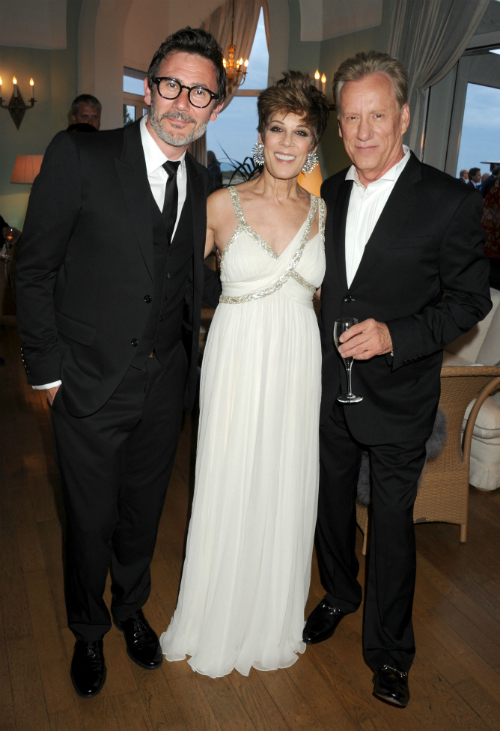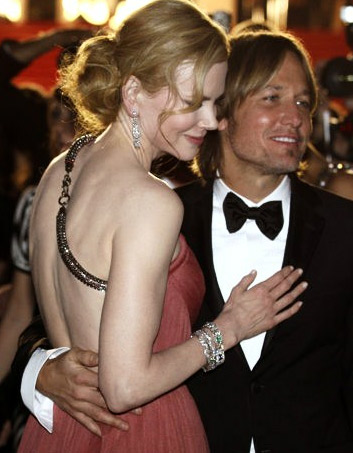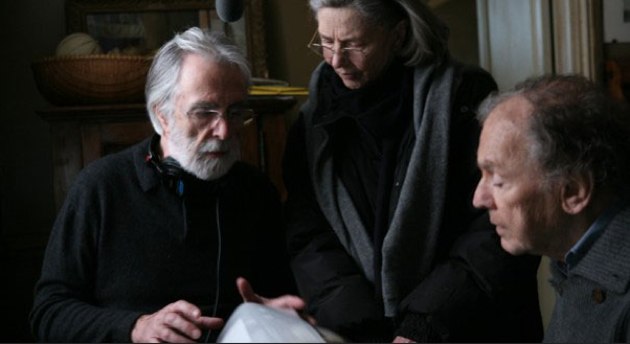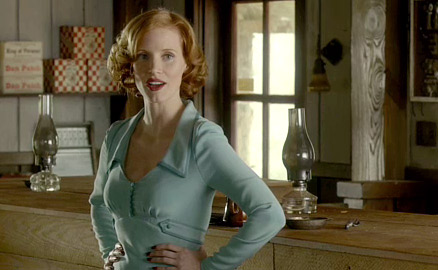High Powered Publicist Peggy Siegal's has just released her Cannes Diary at the Huffington Post. Better three weeks late than never. Peggy throws great Oscar shindigs here in NYC where much handshaking and FYC vote counting happened right before my very eyes last season (remember that party for The Help I wrote about? - that was one of my favorite pieces last year).
Can't wait for the festivities to begin again! For Peggy of course they already have.
 Peggy @ Cannes with Michel Hazanavicius & James Woods
Peggy @ Cannes with Michel Hazanavicius & James Woods
My favorite days of the name-dropping diary (Frank Langella would be proud) both happen to be Thursdays.
May 17th. Jacques Audiard's screening of Rust and Bone at the Palais is packed. Marion Cotillard portrays a marine-park trainer who loses her legs to a killer whale. Stop. It's a love story. A street fighter, played by Belgian Matthias Schoenaerts, literally sweeps her off her digitally-erased feet and I promise you, she is walking into the Oscars this year in a Dior Haute Couture.
Peggy promises! Translation: Take note.
Hey, it's not a bad bet. Even if Rust & Bone proves to outré for the bulk of AMPAS voters there's always Cotillard's other juicy lead role in the tentatively titled Low Life in which she plays a reluctant immigrant prostitute. If The Weinstein Company opts to give that one an Oscar qualifying 2012 release. (Oscar voters do love the world's oldest profession.)
 Kidman and Cotillard, both Oscar winners, won fresh buzz at Cannes last month. Will they snag their fourth and second nominations respectively?
Kidman and Cotillard, both Oscar winners, won fresh buzz at Cannes last month. Will they snag their fourth and second nominations respectively?
Thursday May 24th is my favorite entry. It begins like so.
Lee Daniels shows the The Paperboy. Nicole Kidman is a trailer park Brigitte Bardot. Zac Efron, all grown up, lusts after Nicole wearing underpants. Matthew McConaughey is a hunky gay journalist and John Cusack is the crazy inmate on death-row in this erotic thriller set in1960s Florida.
Lee unabashedly announces at the press conference that his deep understanding of the nutty and violent characters are taken from his personal experience. As he says, "I know these people. My brother is in jail for 18 years for murder." He had Nicole interview seven real women who have long-term relationships with men in jail, adding insight to her stunning performance.
Arriving on Lady Joy, Denise Rich's 170-foot yacht, appropriately disheveled but always chic, Denise whisks me off to her stateroom and instructs her professional hair and make-up staff to fluff me up.
Famous love birds Kanye West and Kim Kardashian are staying on the boat and have just come up from their bedroom for lunch. Kim and I stare at each other's makeup as I sit as close as possible without invading her space. Her skin is like butter. She is quite beautiful.
I rant about every film I have seen. It's a tad too early for Kanye and Kim to digest all this information. Soft-spoken Kanye tells me about his short art film Cruel Summer. Filmed in Qatar, the short is inspired by theRomeo and Juliet-esque classic Middle Eastern tale Antar and Abla.
David Geffen sends the "Rising Sun's" tender, which is larger than my New York Park Avenue apartment to pick me up for lunch. At 453-feet, I board the sixth largest yacht in the world built by Larry Ellison for over $200 million and redesigned by Geffen. From sea level, I climb four flights to greet David. I have three words for him, "Not big enough."
 Lunch is with Keith Urban and Wendi Murdoch on an outdoor deck. Again I rant about every film but to a more astute reception. David tells me he never leaves the boat. Would you, if you had a basketball court on board?
Lunch is with Keith Urban and Wendi Murdoch on an outdoor deck. Again I rant about every film but to a more astute reception. David tells me he never leaves the boat. Would you, if you had a basketball court on board?
On the tender back to shore Keith tells me Nicole and he are moving to the South of France in September for three months while she films Grace of Monaco, a drama about thesp-turned-princess Grace Kelly.
My head is spinning from trying to imagine Kim Kardashian conversing about art movies though I have no trouble imagining the follow up with Keith Urban - he is married to our Nicole after all. But that's Cannes for you - an improbable mix of Household Name Celebrities Famous Just Because They're Famous who might never have set foot in an arthouse in their lives and films made by Household Names if your household happens to be composed entirely of cinephiles. (In which case, can I come over for dinner?)
Believe it or not, this is but a tiny sample. It's a must read. Poor Clive Owen even gets stuck in an elevator with fans for 20 minutes!
P.S. Yes, I'll update the Oscar charts soon.
 Tuesday, June 26, 2012 at 6:11PM
Tuesday, June 26, 2012 at 6:11PM 
 Hugh Jackman,
Hugh Jackman,  NYC,
NYC,  Rose Byrne,
Rose Byrne,  film festivals,
film festivals,  short films
short films 









